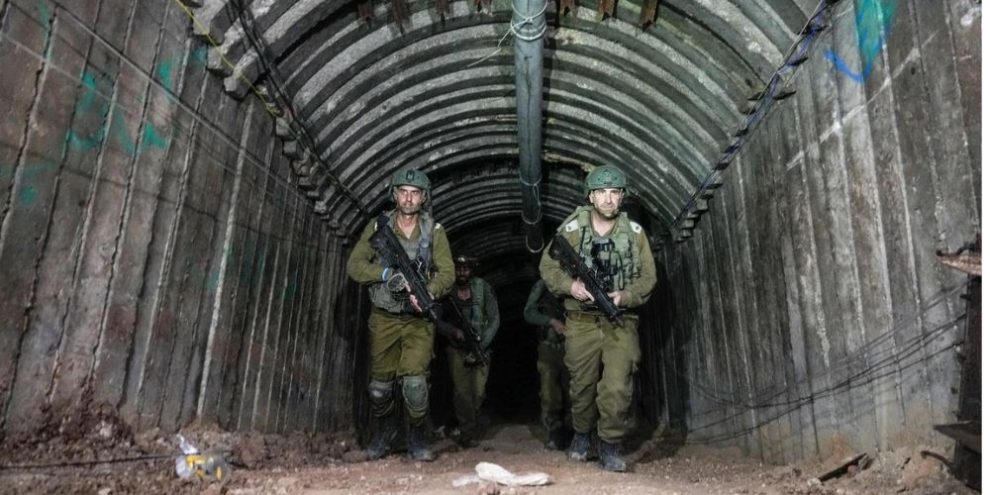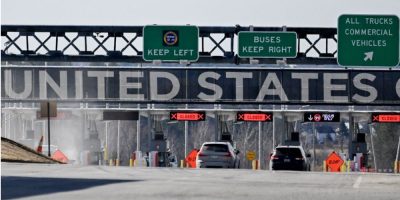
Ariel Schalit and Julia Frankel - The Associated Press
The Israeli military said Sunday it has discovered a large tunnel shaft in Gaza close to what was once a busy crossing into Israel, raising new questions about how Israeli surveillance missed such conspicuous preparations by Hamas for the militants’ deadly Oct. 7 assault.
The entryway to the tunnel is just a few hundred meters from the heavily fortified Erez crossing and a nearby Israeli military base.
The military said that it stretches for more than four kilometres (2½ miles), links up with a sprawling tunnel network across Gaza and is wide enough for cars to pass through. The army said Sunday that the tunnel facilitated the transit of vehicles, militants, and supplies in preparation for the Oct. 7 attack.
That day, militants used a rocket-propelled grenade to break past the portion of the wall close to the Erez crossing and stormed the base, killing at least three soldiers and kidnapping some back to Gaza, the army said. It was one of several places along the border wall where militants easily blew past Israel’s security defenses, entered Israeli territory and killed around 1,200 people and took about 240 others, hostage.
What to know about the war today:
- Israel’s government is facing calls for a cease-fire from some of its closest European allies and from protesters at home.
- It comes after a series of shootings, including of three hostages who waved a white flag, adding to mounting concerns about its conduct in the 10-week-old war in Gaza.
- Israel said aid passed directly from Israel into Gaza for the first time Sunday, with 79 trucks entering from Kerem Shalom, where around 500 trucks entered daily before the war. Another 120 trucks entered via Rafah along with six trucks carrying fuel or cooking gas.
- Aid workers say it’s still far from enough.
The unprecedented attack triggered a devastating war that has raged for more than 10 weeks and claimed more than 18,000 lives in the Hamas-ruled Gaza Strip, according to Palestinian health officials. Israel says the destruction of Hamas’ tunnel network is a major objective and that much of the underground network runs beneath schools, hospitals and residential areas.
Israel’s military, intelligence and political officials have come under heavy criticism for failing to detect the attack ahead of time.
Maj. Nir Dinar, a military spokesperson, said that Israeli security services didn’t know about the tunnel before Oct. 7 because Israel’s border defenses only detected tunnels meant to enter Israel.
“As far as I know, this tunnel doesn’t cross from Gaza into Israel and stops within 400 meters from the border, which means the indicators won’t indicate that a tunnel is being built,” Dinar said. He added that the entrance, a circular cement opening leading to a cavernous passageway, was located under a garage, hiding it from Israeli drones and satellite images.
While the military was aware that Hamas had an extensive tunnel network, Dinar said they didn’t think the militants would be able to carry out their plans for a large-scale attack.
“It’s no surprise that this was the Hamas strategy all along,” Dinar said. “The surprise is that they have succeeded and the size of this tunnel … was really shocking.”
The Erez crossing, a fortress-like facility that processed the movement of Palestinians into Israel for work, medical care and transit to neighbouring Jordan, held great symbolic value for Hamas. The massive crossing was protected by security cameras and military patrols and the adjacent military base. The crossing suffered heavy damage on Oct. 7 and hasn’t reopened.
The army said its special “Yahalom” unit, which specializes in tunnel warfare, has worked to excavate the tunnel since it was first detected. They say they’ve found weapons inside.
“At this point, this is the biggest tunnel in Gaza,” Rear Adm. Daniel Hagari, the chief military spokesman, told reporters in a tour of the tunnel’s entrance on Friday.
Speaking to reporters on Sunday, Hagari said troops had discovered at least two other “city-sized” tunnels of similar in scope, which they are still mapping.
“This was a flagship project that was waiting, finished and ready,” Hagari told a news conference. He noted that tunnel was in use during the war and that Israeli soldiers had killed Hamas militants inside the tunnel.
The army also showed reporters soldiers’ barracks at the nearby base that it said were set ablaze by the militants. They looked like the ashes of a furnace, with blackened walls and smelted bunks. The military announced Friday that it had recovered in Gaza the bodies of two soldiers who were working at the base on Oct. 7.
Dinar, who visited the tunnel Friday, said it was twice the height and three times the width of other tunnels found in Gaza. He said it is equipped with ventilation and electricity and dives 50 meters underground in some points. He said it was clear that millions of dollars as well as a great deal of fuel and workforce had been needed to build and sustain the tunnel.
Hagari said the military planned to destroy the tunnel and continue to “hunt” militants hiding in others.
“We will hunt them even if we need to go down to the tunnels,” Hagari said. “We also need to do it with attention to the rescue of our hostages and the understanding that maybe some of them are in the tunnels.”
banner image: The Associated Press





